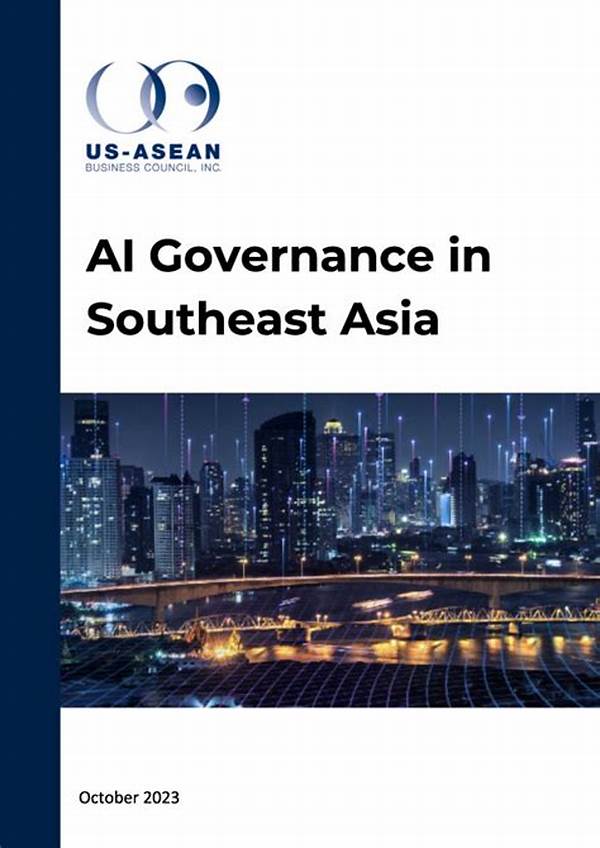The Future of AI Regulation in Southeast Asia
Attention, all digital trailblazers, tech enthusiasts, and forward-thinking policymakers! As AI technologies surge forward at an unprecedented pace, the Southeast Asian region stands at a critical crossroads. Here lies an opportunity, a transformative juncture, to mold the trajectory of AI within this vibrant region. What does the future hold? How will regulation, innovation, and cultural integrity confluence in the creative cascade that is Southeast Asia?
Read More : Why Ai Cybersecurity Tools Are Crucial
As we delve into the future of AI regulation in Southeast Asia, it becomes increasingly evident that the path is riddled with challenges and opportunities alike. The stakes are high, offering both the promise of unparalleled innovation and the risk of societal disruption if left unchecked. Not just a mere buzzword, the future of AI regulation in Southeast Asia is a canvas, ripe for policies that are as dynamic as the technology itself, ensuring AI serves as a beacon of progress, equity, and sustainability.
With a mix of burgeoning tech capitals and emerging markets, Southeast Asia finds itself poised on the brink of a digital revolution. The challenge? Crafting and implementing regulations that not only cater to the unique cultural and economic diversity of the region but also set a global benchmark in ethical AI deployment. Now is the time to rally, innovate, and legislate to steer the ship of technology toward a brighter future. Get ready to explore how this region will spearhead the great AI regulatory adventure!
The Catalyst for Change: Regulatory Innovations
As technology rapidly evolves, regulations need not just to follow but anticipate. In Southeast Asia, we are witnessing an era where countries are striving to balance innovation with the public’s evolving expectations on safety and privacy. Anyone interested in technology, policy, or the socio-cultural fabric of Southeast Asia cannot ignore the importance of the future of AI regulation in Southeast Asia.
—
The Path Forward for AI Regulation
Let’s embark on a digital odyssey to understand how Southeast Asian nations are taking steps to regulate AI effectively. The initiatives are varied, but each aims to foster innovation while addressing privacy and ethical concerns.
At the heart of the matter, the central question arises — who will lead the charge in setting a robust regulatory framework? Singapore, known for its push toward digital progression, is one candidate, spearheading efforts in establishing an encompassing AI governance framework that can serve as a model region-wide. Meanwhile, in countries like Indonesia and Thailand, discussions revolve around integrating AI with cultural heritage preservation, a unique approach that reflects Southeast Asia’s rich tapestry of traditions.
Balancing Innovation and Ethics
Artificial Intelligence comes laden with promises as well as potential perils. In Southeast Asia’s regulation strategy, the emphasis is on crafting an AI policy that uniquely resonates with the economic incentives and ethical paradigms of its societies. The dynamic nature of this region offers a startling opportunity to create regulations that align innovation with ethical guardrails.
Perspectives on Regional Collaboration
Regional collaboration could be a game-changer. ASEAN, with its collective spirit, presents an opportunity to establish a cohesive strategy for AI regulation, one which emphasizes cross-border cooperation in technological governance. This alliance could enable a more synchronized response to AI advancements, ensuring that the future of AI regulation in Southeast Asia is not only technologically sound but also culturally sensitive and inclusive.
Countries in Southeast Asia are not only responding to AI but also playing a starring role in defining what responsible AI administration looks like on the world stage. The future of AI regulation in Southeast Asia could very well become a blueprint for other regions aiming for a tech-driven but ethically grounded future.
AI Regulation Objectives in Southeast Asia
—
A Deep Dive Into the Future of AI Regulation Structure
The landscape of AI regulation in Southeast Asia is as diverse as the region itself. From bustling tech hubs to quaint rural landscapes, each area offers unique insights into a comprehensive regulatory framework. Across the region, there is an enthusiastic drive to cultivate an ecosystem that embraces innovation while safeguarding rights and ethical standards.
Conversations around the future of AI regulation in Southeast Asia often highlight the need for a structured and scalable approach. This involves not only understanding the technological aspects but also addressing societal impacts. Countries are likely to adopt a phased approach, first laying down core ethical principles before moving toward more complex technical guidelines. A collaborative dialogue among stakeholders, including government, industry leaders, and citizen advocacy groups, is essential. This dialogue ensures that as AI technology advances, its regulation remains relevant, equitable, and beneficial for all.
Collaborative Goals for the Region
In achieving these ambitious aims, one cannot overlook the necessity for shared objectives. These involve creating policies tailored to the region’s plurality yet robust enough to adapt to technological shifts.
Strategic Frameworks and Policy Implementation
To ensure the consistent application of regulations, Southeast Asia may look to develop a strategic framework that outlines essential policy principles. Crafting such frameworks will rely on shared knowledge and learning from the challenges and successes of technology governance observed worldwide.
Ultimately, the aim is to carve out a niche where the future of AI regulation in Southeast Asia is synonymous with cutting-edge technology that respects and uplifts its millions of inhabitants.
Insights into the Regional Approach
Navigating the changing tides of technology demands insight and foresight. Embracing the complexities of AI regulation can drive the region toward harmonious growth. Let’s deconstruct how each piece fits into the grand puzzle that is the future of AI regulation in Southeast Asia.
Crafting Policies with Cultural Sensitivity
Countries within Southeast Asia are rich in cultural diversity and history, which is integral when shaping AI policies. Regulations will need to be crafted not only with a focus on technological innovation but also with immense cultural sensitivity and appreciation for local customs and values.
Emphasizing Global Partnerships
Delving into an in-depth narrative about AI regulation sheds light on the nuanced and multifaceted strategies that countries in Southeast Asia are adopting. This endeavor is crucial for ensuring that technological advancement aligns with regional aspirations, paving the way for a future where AI benefits society at large.
Bridging Cultural and Technological Landscapes
Central to regulatory developments is the bridging of cultural richness with the technological leap. Amid the lofty skyscrapers and dense tropical jungles, Southeast Asia’s unique positioning offers unmatched opportunities to align tech advancements with cultural landscapes.
Educational Initiatives for Innovation
Education plays a pivotal role in this grand narrative. By inspiring and equipping the next generation with tools to master AI, Southeast Asian countries can empower their citizens to participate actively in the region’s technocratic future. Educational initiatives should focus on incentivizing innovation while grounding it in local wisdom and needs.
—
Exploring the Potential for AI Growth in the Region
In the grand tapestry of AI evolution, Southeast Asia stands as a beacon of potential and ingenuity. Within this context, nations are working to lay down a firm regulatory foundation that can support burgeoning AI sectors. Each nation presents its own story, with lessons carved out of challenges and successes that could light the way for others.
The Future of AI Regulation: A Synopsis
As countries forge ahead with their regulatory mechanisms, a critical theme emerges: harmony. The future of AI regulation in Southeast Asia hinges on a delicate balance between innovation, ethics, and societal wealth. What lies ahead is not just an era of AI advancement but one where technology and humanity intersect in profound and meaningful ways.
Witness how regulations can inform and transform the very fabric of a diverse and vibrant society. Join the conversation and be part of the unfolding story that is the future of AI regulation in Southeast Asia.


